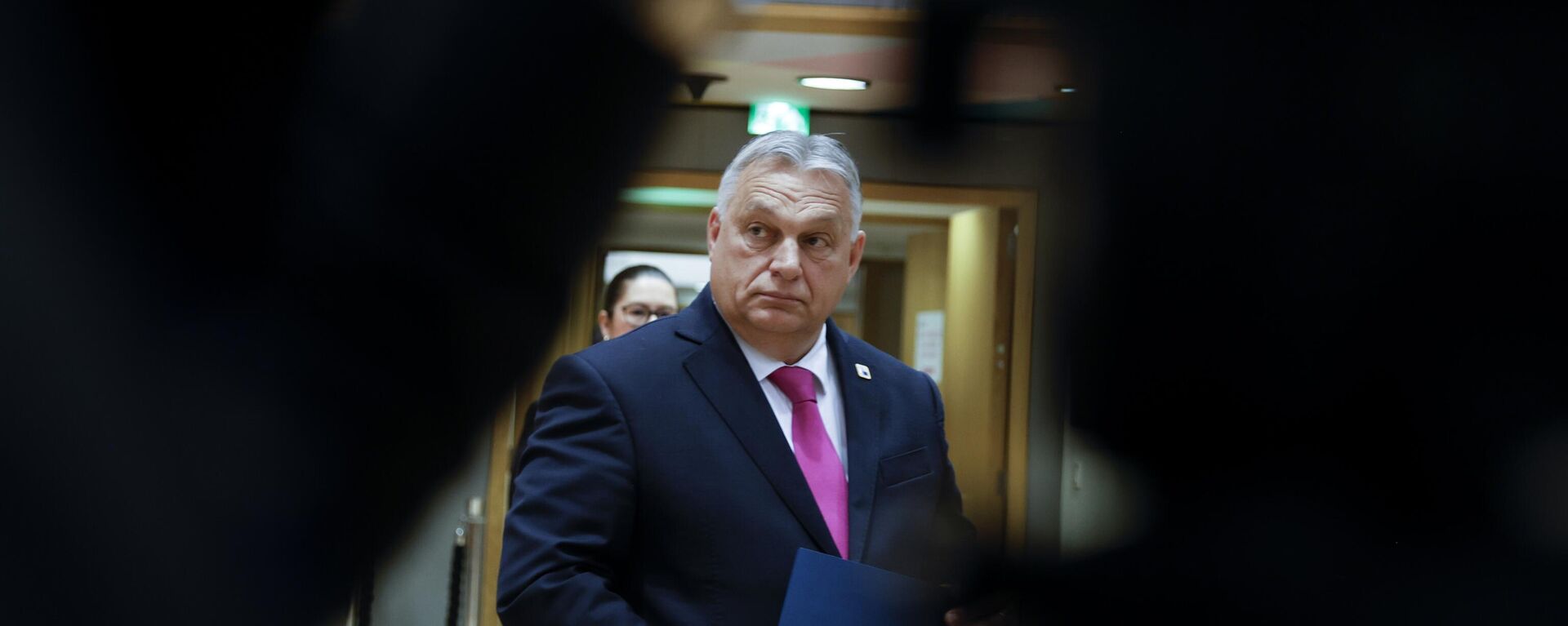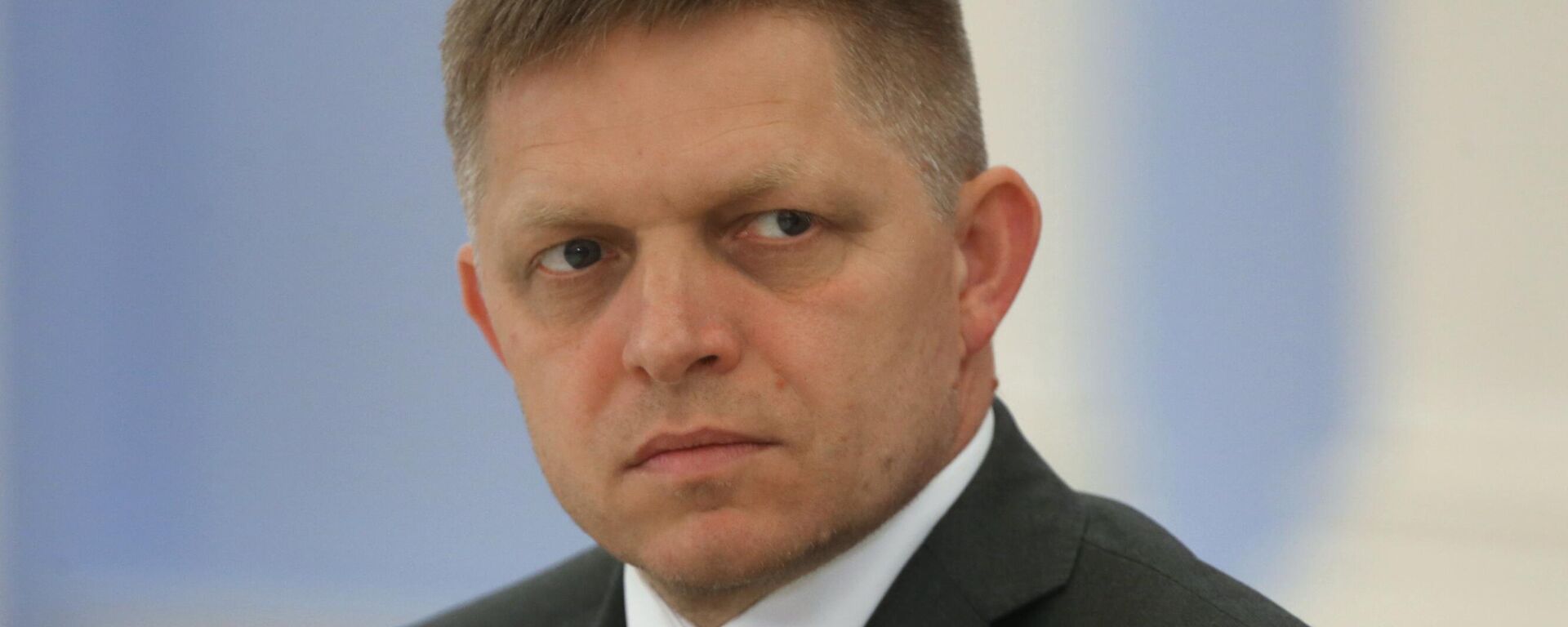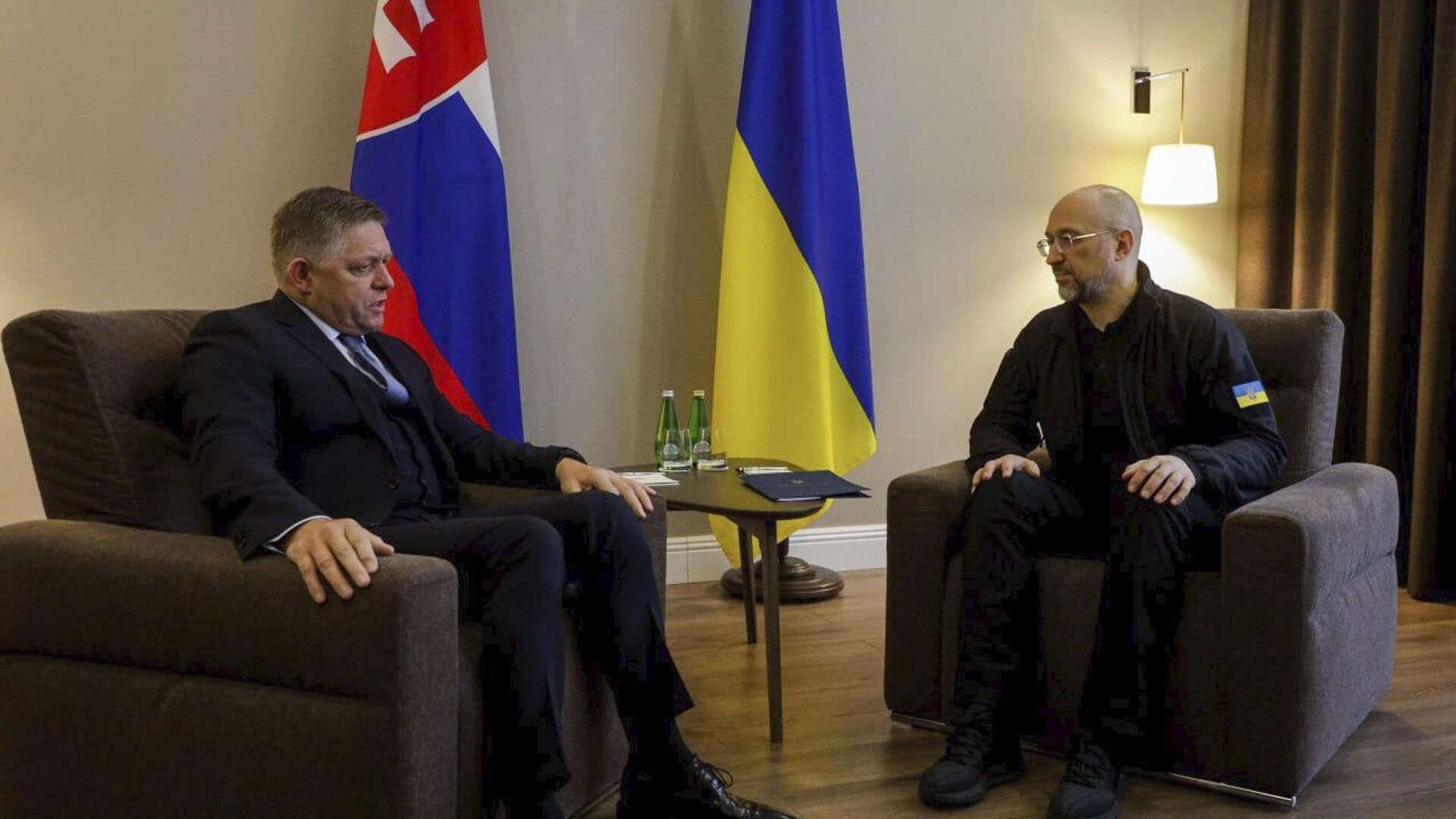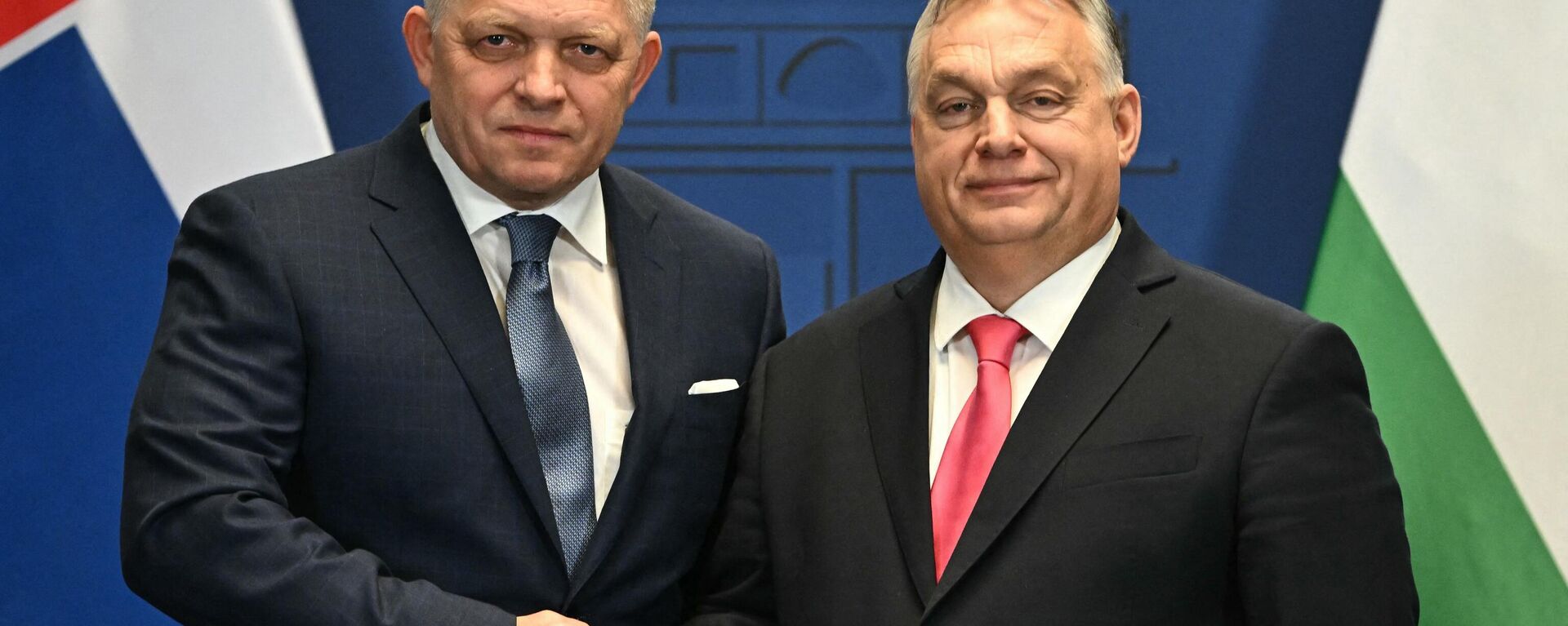https://sputnikglobe.com/20240125/what-drove-slovak-pm-ficos-symbolic-visit-to-ukraines-uzhgorod-1116381164.html
What Drove Slovak PM Fico's 'Symbolic' Visit to Ukraine's Uzhgorod?
What Drove Slovak PM Fico's 'Symbolic' Visit to Ukraine's Uzhgorod?
Sputnik International
Slovak Prime Minister Robert Fico visited the western Ukrainian city of Uzhgorod on Wednesday for a meeting with his counterpart Denis Shmygal. Ahead of the... 25.01.2024, Sputnik International
2024-01-25T14:28+0000
2024-01-25T14:28+0000
2024-01-30T10:31+0000
analysis
russia
slovakia
hungary
uzhgorod
peter szijjarto
robert fico
sputnik explains
https://cdn1.img.sputnikglobe.com/img/07e8/01/19/1116377701_0:58:1280:778_1920x0_80_0_0_46450a1c438e7640f677e47ffadfa9ca.jpg
Uzhgorod, a city on the Uzh River in western Ukraine, has made headlines as a result of Slovak Prime Minister Robert Fico's visit there on Wednesday.The choice of this particular venue for Fico’s talks with Ukraine’s Prime Minister Denis Shmygal, and for a later face-off between Hungarian Foreign Minister Peter Szijjarto with Zelensky regime officials, is no accident.Uzhgorod was selected for specific “reasons,” with Robert Fico’s visit there “seen as a balancing act,” Milan Uhrik, Member of European Parliament from Slovak republic and Leader of the Political Movement REPUBLIKA, told Sputnik.Subsequently, the Slovak PM met with his German counterpart Chancellor Olaf Scholz of the Social Democratic Party (SPD). Germany is “a very important ally” in terms of “assurement” of the Slovak faction in the European Parliament after elections in June 2024, said the pundit.Relations between Slovakia and Germany soured after the leader of Slovakia's new government Robert Fico began to question continuously supporting Ukraine. Scholz’s SPD was among those in the Socialists and Democrats (S&D) group of the European Parliament who were particularly eager to suspend Slovak members belonging to Robert Fico's Smer-SD party after it secured the most votes in the country's parliamentary elections in 2023. The move came amid backlash Fico faced for unwillingness to toe the US-driven anti-Russia narrative.Prime Minister Robert Fico, who arrived in the western Ukrainian city of Uzhgorod on Wednesday, said it was a “more practical" venue for meeting his counterpart because the city sits on the border with Slovakia. Ahead of his meeting with Shmygal, Fico was asked by a journalist why he was not going to the capital, Kiev. The Slovak PM replied that Uzhhorod was chosen by the Ukrainian side.Fico also stressed earlier that Slovakia would veto Ukraine’s NATO membership bid, telling broadcaster RTVS it would be the "foundation of World War 3."Despite reportedly receiving a death threat, Hungarian Foreign Minister Peter Szijjarto will proceed with his visit to Uzhgorod on January 29 to meet with Ukraine's officials. The threat, written in Ukrainian, was sent to the Hungarian Embassy in Ukraine's email address, as per Hungarian news site Index. However, Hungary's Foreign Ministry has stated that the threat "will not deter Szijjarto from representing Hungary's interests". In a video message on social media, Szijjarto elaborated that Uzhgorod, situated near the Slovak and Hungarian borders, is home to a significant number of Hungarian-speaking Ukrainian citizens.However, since the Maidan coup in 2014, Kiev has adopted a spate of policies aimed at limiting the use of the Russian language on TV and in public places, including in education and the service sector. It was this discrimination of the Russian-speaking population that fueled the armed civil confrontation in Ukraine, which culminated in the Donetsk and Lugansk people's republics declaring their independence and, finally, appealing to Russia for help in defending themselves against Ukrainian aggression in late February 2022.Hungary's Prime Minister Viktor Orban who has rejected Brussels' self-harming sanctions targeting Moscow over Ukraine, and blocked €50bn ($55bn) in EU aid for Ukraine in December, has now pointed to discrimination against the Hungarian minority in Ukraine's far western regions. Budapest referred to Ukraine's 2017 language law amendments, which require at least 70% of education above the fifth grade to be conducted in Ukrainian. This legislation was amended last December, making it possible to study in the Hungarian language up to the end of high school. Both Robert Fico's and Peter Szijjarto's visits to Uzhgorod come as their countries face backlash from the Kiev regime's main Western backers.Weighing in on the message contained in Robert Fico’s recent statements, Milan Uhrik told Sputnik that one may expect “two lines of communication about the decision of not sending the weapons.”According to the pundit, the visit to Uzhgorod "can be seen as a balancing act." Western countries eager to fuel NATO’s proxy conflict against Russia in Ukraine have been “putting pressure on the Slovak government through the institutions of the EU and various resolutions,” said the expert, so the Slovak PM “is trying to sway them more to his side through this symbolic visit,” stressed Uhrik.
https://sputnikglobe.com/20240124/slovakia-hungary-undeterred-by-pressure-and-threats-over-ukraine-aid-1116354480.html
https://sputnikglobe.com/20231215/hungarys-orban-has-at-least-3-good-reasons-to-reject-ukraines-geopolitical-eu-membership-drive-1115609468.html
https://sputnikglobe.com/20231026/slovak-prime-minister-fico-says-country-will-not-provide-military-assistance-to-ukraine-1114492088.html
russia
slovakia
hungary
uzhgorod
Sputnik International
feedback@sputniknews.com
+74956456601
MIA „Rosiya Segodnya“
2024
News
en_EN
Sputnik International
feedback@sputniknews.com
+74956456601
MIA „Rosiya Segodnya“
Sputnik International
feedback@sputniknews.com
+74956456601
MIA „Rosiya Segodnya“
robert fico's visit to uzhgorod, hungarian foreign minister peter szijjarto's visit to ukraine's uzhgorod, peter szijjarto gets ukrainian death threats, hungary's veto on eu's assistance to ukraine, the eu's military assistance to kiev
robert fico's visit to uzhgorod, hungarian foreign minister peter szijjarto's visit to ukraine's uzhgorod, peter szijjarto gets ukrainian death threats, hungary's veto on eu's assistance to ukraine, the eu's military assistance to kiev
What Drove Slovak PM Fico's 'Symbolic' Visit to Ukraine's Uzhgorod?
14:28 GMT 25.01.2024 (Updated: 10:31 GMT 30.01.2024) Slovak Prime Minister Robert Fico visited the western Ukrainian city of Uzhgorod on Wednesday for a meeting with his counterpart Denis Shmygal. Ahead of the trip, Fico made headlines by saying Slovakia would veto Ukraine’s NATO membership bid, as “it would be the foundation of World War 3."
Uzhgorod, a city on the Uzh River in western Ukraine, has made headlines as a result of
Slovak Prime Minister Robert Fico's visit there on Wednesday.
The choice of this particular venue for Fico’s talks with Ukraine’s Prime Minister Denis Shmygal, and for a later face-off between Hungarian Foreign Minister Peter Szijjarto with Zelensky regime officials, is no accident.
Uzhgorod was selected for specific “reasons,” with Robert Fico’s visit there “seen as a balancing act,” Milan Uhrik, Member of European Parliament from Slovak republic and Leader of the Political Movement REPUBLIKA, told Sputnik.
“The first is security... The second is geographical proximity” to the next venue on Fico’s schedule,” said Uhrik.
Subsequently, the Slovak PM met with his German counterpart Chancellor Olaf Scholz of the Social Democratic Party (SPD). Germany is “a very important ally” in terms of “assurement” of the Slovak faction in the European Parliament after elections in June 2024, said the pundit.
Relations between Slovakia and Germany soured after the leader of Slovakia's new government Robert Fico began to question continuously supporting Ukraine. Scholz’s SPD was among those in the Socialists and Democrats (S&D) group of the European Parliament who were particularly eager to suspend Slovak members belonging to Robert Fico's Smer-SD party after it secured the most votes in the country's parliamentary elections in 2023. The move came amid backlash Fico faced for unwillingness to toe the US-driven anti-Russia narrative.
Prime Minister Robert Fico, who arrived in the western Ukrainian city of Uzhgorod on Wednesday, said it was a “more practical" venue for meeting his counterpart because the city sits on the border with Slovakia. Ahead of his meeting with Shmygal, Fico was asked by a journalist why he was not going to the capital, Kiev. The Slovak PM replied that Uzhhorod was chosen by the Ukrainian side.
Fico also
stressed earlier that Slovakia would veto Ukraine’s NATO membership bid, telling broadcaster RTVS it would be the "foundation of World War 3."
Despite reportedly receiving a
death threat, Hungarian Foreign Minister Peter Szijjarto will proceed with his visit to Uzhgorod on January 29 to meet with Ukraine's officials. The threat, written in Ukrainian, was sent to the Hungarian Embassy in Ukraine's email address, as per Hungarian news site Index. However, Hungary's Foreign Ministry has stated that the threat
"will not deter Szijjarto from representing Hungary's interests". In a video message on social media, Szijjarto elaborated that Uzhgorod, situated near the Slovak and Hungarian borders, is home to a significant number of Hungarian-speaking Ukrainian citizens.
The population of Uzhhorod, the administrative center of Transcarpathian Ukraine, consisted of 6.9 percent Hungarians, and 2.2 percent Slovaks in 2001, according to Ukrainian census data. The same census showed that over 14.3 million Ukrainians, or almost 30% of the country's population, called Russian their native language.
However, since the
Maidan coup in 2014, Kiev has adopted a spate of policies aimed at limiting the use of the Russian language on TV and in public places, including in education and the service sector. It was this
discrimination of the Russian-speaking population that fueled the armed civil confrontation in Ukraine, which culminated in the Donetsk and Lugansk people's republics declaring their independence and, finally, appealing to Russia for help in defending themselves against Ukrainian aggression in late February 2022.
Hungary's Prime Minister Viktor Orban who has rejected Brussels'
self-harming sanctions targeting Moscow over Ukraine, and blocked €50bn ($55bn) in EU aid for Ukraine in December, has now pointed to
discrimination against the Hungarian minority in Ukraine's far western regions. Budapest referred to Ukraine's 2017 language law amendments, which require at least 70% of education above the fifth grade to be conducted in Ukrainian. This legislation was amended last December, making it possible to study in the Hungarian language up to the end of high school.

15 December 2023, 17:22 GMT
Both Robert Fico's and Peter Szijjarto's visits to Uzhgorod come as their countries face backlash from the Kiev regime's main Western backers.
Fico's Smer party-led government, elected in the September 2023 general election, reversed the country's stance on the Ukrainian crisis in favor of stopping military supplies to Kiev. Fico stressed that aiding the Kiev regime weakens the Slovak armed forces and only prolongs a conflict that Ukraine has no chance of winning.
Weighing in on the message contained in Robert Fico’s recent statements, Milan Uhrik told Sputnik that one may expect “two lines of communication about the decision of not sending the weapons.”
“To the domestic audience, cancelling arms supplies is presented as a ‘sovereign political decision’. In relation to foreign partners and their diplomatic representation, communication can be different, in the style that "there is nothing left to send" due to the excessive activity of the previous government. This may be mainly to make it easier for allies or foreign partners to accept. So it is worth considering whether it is about sovereignty or about maneuvering,” said Uhrik.
According to the pundit, the visit to Uzhgorod "can be seen as a balancing act."
Western countries eager to fuel NATO’s proxy conflict against Russia in Ukraine have been “putting pressure on the Slovak government through the institutions of the EU and various resolutions,” said the expert, so the Slovak PM “is trying to sway them more to his side through this symbolic visit,” stressed Uhrik.

26 October 2023, 09:14 GMT







